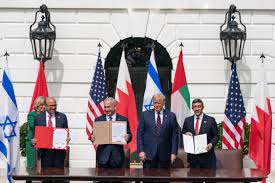The Significance of the Abraham Accords in Middle Eastern Relations

Introduction
The Abraham Accords, signed in September 2020, represent a significant diplomatic breakthrough in the Middle East. This agreement normalises relations between Israel and several Arab nations, including the United Arab Emirates (UAE) and Bahrain, marking a departure from decades-long hostilities and contributing to regional stability. Understanding these accords is essential as they not only shape Israel’s diplomatic landscape but also offer insights into future Arab-Israeli relations and geopolitical dynamics in the region.
Details of the Abraham Accords
The Accords were brokered with extensive facilitation from the United States, under the administration of former President Donald Trump. Signed at the White House, the agreements not only brought Israel closer to the UAE and Bahrain but also encouraged other nations, such as Sudan and Morocco, to engage in similar diplomatic overtures. The Accords focus on economic cooperation, technological exchange, and tourism, laying a foundation for mutual prosperity among the signatory nations.
In the months following the signing, the implementation of the Accords saw a surge in bilateral trade and technology agreements between Israel and the UAE. For instance, the two nations have engaged in joint ventures in fields such as renewable energy, agriculture, and healthcare, which have proven beneficial for both economies.
Regional Implications
The immediate aftermath of the Abraham Accords has shifted the power dynamics in the Middle East. The agreement indicates a growing willingness among Arab nations to engage with Israel independently of the Palestinian issue, which has been a longstanding sticking point in regional politics. Additionally, the Accords have prompted a reevaluation by Iran, which perceives the growing Israel-Arab alliances as a threat and has responded with heightened rhetoric and military posturing.
Moreover, the reconciliation between Israel and Arab states could signal potential pathways for peace negotiations concerning Palestine, as the Accords suggest that broader regional peace may be achievable without complete resolution on the Palestinian front.
Conclusion
The Abraham Accords are a transformative milestone in Middle Eastern diplomacy, indicating a paradigm shift towards normalisation and cooperation. As the geopolitical landscape evolves, these agreements will influence not only the involved nations but will also affect international stakeholders, including the United States, Europe, and global investors keen on stability in the region. Moving forward, the effectiveness of these accords in fostering long-lasting peace and cooperation remains to be seen, yet their significance as a foundation for future discussions cannot be overstated.
